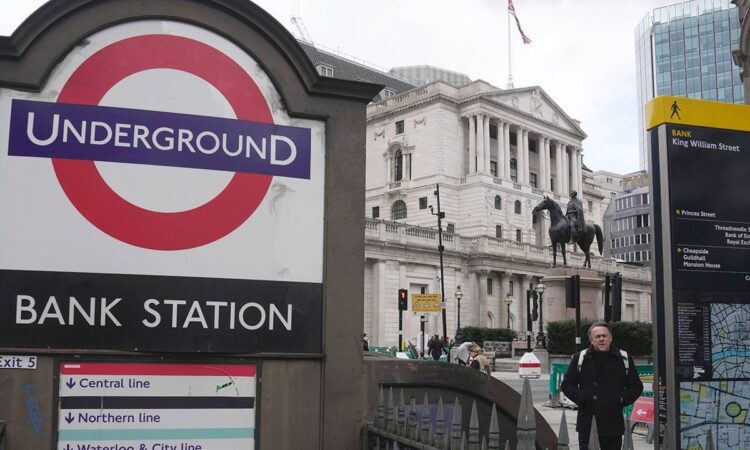
NEW YORK CITY: Stubbornly high UK inflation and worries about future central bank moves to tame rampant consumer prices helped drag down stocks across much of the world on Wednesday.
London’s benchmark FTSE 100 index ended 0.1 percent lower after official data stoked expectations of another interest-rate hike from the Bank of England that could weigh further on the economy.
Britain’s annual inflation rate slowed in March but held above 10 percent on soaring food prices, further fueling the country’s cost-of-living crisis.
Wall Street closed relatively flat following mixed corporate results, while Asian markets ended mostly lower.
Frankfurt and Paris bucked the trend, however, edging up.
World oil prices shed 2 percent on fears that the US Federal Reserve (Fed) could also hike rates sharply again, in turn denting demand for crude, before paring losses.
Souring the mood
“Stubbornly high inflation soured the mood,” noted Russ Mould, investment director at stockbroker AJ Bell.
“News that UK CPI (consumer prices index) remains in double digits will only strengthen the argument for the Bank of England (BoE) to keep pushing up interest rates,” he said.
The BoE has hiked rates 11 times since late 2021 in an unsuccessful bid to keep inflation close to a 2-percent target.
Higher borrowing costs have exacerbated the UK’s cost-of-living crisis, ramped up loans for businesses and consumers, and dampened activity.
Investors are also focusing on earnings from Morgan Stanley bank and electric carmaker Tesla, which reported after the close of US trading.
Morgan Stanley reported drops in both revenue and profit, and its shares closed 0.7 percent lower.
The flat US markets were a reflection of the “pretty mixed” earnings results in recent days, said Maris Ogg from Tower Bridge Advisors.
“We’ll see what happens when we really start getting the regional banks next week,” she added.
Chris Beauchamp, chief market analyst at online trading platform IG, said “a more cautious mood” is creeping in after a reasonable start to earnings season.
This is understandable, he added, given fears of a recession taking place within the next year.
“Losses have been relatively contained, however, with stocks caught more in a period of indecision rather than heading into another big sell-off,” he added.
Analyst Stephen Innes, of SPI Asset Management, said investors were also dwelling on the Fed’s outlook.
“Global traders have seemingly moved into defensive mode as the debate goes on whether the Fed is at the top of its hiking cycle,” Innes noted.
That debate remained far from settled, with some analysts warning that certain investors’ apparent confidence in coming rate cuts was misplaced.
Briefing.com analyst Patrick O’Hare pointed to rising US bond yields, an indication of higher borrowing costs for companies and consumers.
This “has cast some pressure on growth stocks that had been rallying with the move down in rates and expectations that the Fed will cut rates more than once before the end of the year,” he said.
“With the re-think on that front, some money is being taken off the table,” he added.





